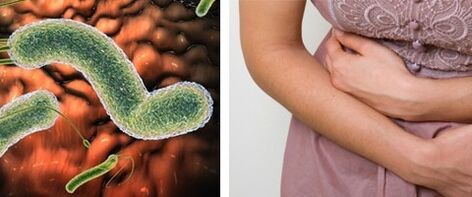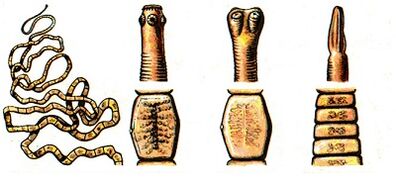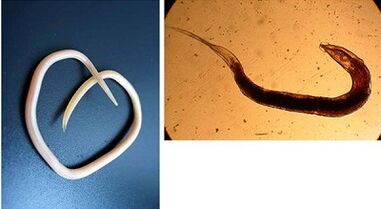
Dry statistics say that half of the world's population are carriers of parasitic worms. Currently, scientists have more than 200 species of them. A person lives for many years, not paying attention to the symptoms and not knowing about the presence of uninvited "guests". But more often the opposite happens: an organism, weakened by the presence of parasites, becomes an easy "prey" for various kinds of diseases, up to oncology. Some of the worms are removed with medication, but there are also those that get rid of only by surgery.
Varieties of parasites and methods of infection
For a successful fight you need to know the enemy by sight. What are the parasites in the human body and where exactly should you look for them?
- Roundwormsare the most common group. These include pinworms, roundworms, toxocara, whipworms, scrapes. They live in the digestive system of humans. Infection occurs when eating unwashed vegetables, fruits, greens. At the same time, you need to wash any products, even from your own garden. There is also a danger of getting helminths by eating salted fish, bacon and poorly fried meat. At risk are those who have pets - cats and dogs. Some parasites do not multiply in animals, but the latter are their active carriers.
- Tape- pork and bovine tapeworms, echinococcus, broad tapeworm. These are the largest representatives of worms - tapeworm, for example, reaches 25 m in length. They have the unique ability to nourish the entire body. In addition, they can move throughout the human body, including the brain and spinal cord. Worms of this class are infected by eating poorly cooked meat and fish - a sick individual may be the source of a tasty dish. Products that have passed strict veterinary control should be purchased.
- Subcutaneous- dirofilaria, filamentous nematode, rishta. They multiply in the host's subcutaneous tissue. The most widespread parasites of this type are found in tropical countries - India, Iraq, Africa. The infection is spread by blood-sucking insects - mosquitoes, flies, bedbugs. Its main symptom is a small formation, which, when pressed on it, moves.
- Trematodes (flukes)- fasciola (hepatic fluke), schistosoma, fascilopsis. They live in the liver, biliary tract, pancreas, intestines. The infection is caused by half-baked, poorly salted or undercooked fish. Drinking unboiled water also contributes to the acquisition of parasites.
- Tissue- trypanosomes, Finns live in the brain and spinal cord, sarcosporidia - in striated muscles, and microsporidia - in connective tissues. This class lives in various tissues of the body. Basically, the carriers are wild and domestic animals and birds - horses, sheep, pigs, chickens, ducks, dogs, cats. Through poorly cooked meat, parasites make their way into the human body.
Infection Symptoms

It is not always realistic to easily determine that “guests” have settled in the body. An infected person is capable of being unaware of their presence for several years. Very often, the signs of the presence of parasites are very similar to the symptoms of certain diseases. There is a whole list of signals that the body gives in case of danger:
- anemia - an excessive number of protozoa provokes large blood loss, which is the cause of iron deficiency;
- nausea, abdominal pain - worms irritate and damage the walls of internal organs, as a result of which wounds, microcracks and inflammation are formed;
- alternation of constipation and diarrhea - the first symptom occurs due to the large number or excessive size of parasites in the body, which contributes to the blockage of the intestinal lumen. The appearance of diarrhea is provoked by special substances secreted by the protozoa that can destroy chlorides and sodium;
- flatulence (increased gas production) and bloating are the result of inflammation in the digestive tract damaged by worms. Because of this, the absorption of fats in the small intestine does not occur, which immediately enter the large intestine;
- Bruxism (grinding teeth) is a clear sign of infection. This is how the nervous system reacts to a certain stimulus;
- skin problems - peeling, acne, boils, eczema, papillomas, warts, changes in the structure of hair and nails, allergic manifestations. These symptoms occur due to the fact that the protozoa release many toxins that the liver cannot cope with with the elimination. Accordingly, they all accumulate inside a person. The body tries to get rid of this dirt in any way, including removing it through the skin;
- a sharp decrease or increase in weight - "thanks to" the absorption of nutrients by worms, the human body experiences a lack of them, which leads to a decrease in weight; weight gain occurs due to a drop in blood sugar, which increases the feeling of hunger, which the patient has to constantly satisfy;
- aches in the joints and muscles are due to the movement of parasites through the body and their establishment in muscles and joint fluid. This symptom speaks of tissue inflammation;
- deterioration of immunity, which causes permanent diseases that are difficult to diagnose. The reason for this is the struggle of the human immune system with worms. With this symptom, the amount of immunoglobulin decreases, and the body becomes helpless against the attacks of viruses and infections;
- frequent cough, profuse sputum production, runny nose, fever occur due to the worms entering the respiratory tract during migration. Parasites in the body can provoke the development of asthma and pneumonia;
- increased fatigue, nervousness, irritability are caused by the fact that worms consume nutrients necessary for a person, which the body does not receive - magnesium, potassium, calcium, iron;
- when infected with pinworms, severe itching in the anus is added to the listed symptoms of the presence of parasites. This is due to the fact that female pinworms crawl out by night to lay eggs, which sometimes causes an intolerable burning sensation.

Seeing a doctor
If at least 3-4 of the above symptoms are found in a person, then as soon as possible you need to see a doctor and undergo treatment.
In such cases, contact the following specialists:
- parasitologist;
- helminthologist;
- infectious disease specialist;
- pediatrician;
- therapist.
A specialist will definitely give a referral for tests and, based on their results, will select the optimal therapy. Depending on the symptoms and treatment should be appropriate. Research alone is unlikely to provide a definitive answer on the presence or absence of parasites. Tests for some types of worms are taken 7-8 times.
Another important nuance:if the infection is confirmed, then all family members are treated and prevented from parasites. Most of the protozoa quickly spread through everyday life: through dishes, household items.
The reason for going to the doctor is the following:
- recent return from a trip abroad, especially from African or Asian countries;
- the presence of various impurities in the feces - mucus, blood;
- sudden weight loss;
- itching at the anus;
- prolonged diarrhea or alternating constipation with diarrhea;
- frequent colds or other illnesses.

There are a number of symptoms that accompany helminthiasis. Few people realize that banal fatigue can be a consequence of helminthic invasions. A baby who has become infected with parasites immediately begins to lose his appetite, and he does not even want to eat his favorite dishes, he wants to eat sweets. There are pains and cramps in the abdomen, nausea (especially in the morning), diarrhea. Often a child becomes moody, irritable, his sleep is disturbed, teeth grinding can be observed in a dream (although today scientists argue whether grinding is a sign of helminthiasis), emptying of the bladder, coughing (without signs of a cold). Worms cause in children a delay in physical and mental development, with helminthiasis, puberty occurs later, a disorder of memory and thinking is observed.
At risk are fans of dried and semi-raw meat, thermally unprocessed minced meat, fresh fish. This also includes children of preschool and primary school age, pet owners, employees of veterinary clinics and those who, in professional or other activities, often work with the land. For example, summer residents.
To prevent infection with parasitic worms, you must follow some rules:
- wash hands more often, especially for children and adults after contact with animals;
- kill domestic insects - flies, mosquitoes, cockroaches;
- wash vegetables and fruits thoroughly, preferably with warm boiled water.
Medication Treatment
A wide range of pharmaceuticals are available to combat parasites. Those who want to get a good result in the fight against an internal enemy need to know against whom the war is going. This is found out only after visiting a doctor and passing tests.
Of course, there are drugs that can successfully cure several types of worms at once. However, they kill not only parasites, but also useful microflora of people. After taking them, a course of restorative therapy is performed.
In no case should you heal yourself. All antiglinal agents are synthetic drugs that can have toxic effects on the liver, blood cells and the immune system. For this reason, do not use them without the need and advice of a doctor. For prevention, it is better to use folk recipes for treating worms in humans.
Folk remedies
Even if there are no symptoms of parasites, prophylaxis is carried out every six months or a year. It has long been known that worms cannot tolerate odorous herbs and plants: onions, garlic, tansy, wormwood. The oldest known remedy for helminths is pumpkin seeds. It is enough to purchase a package of this product in any pharmacy or store, carefully peel (but so as not to remove the green shell) and eat.
There are many popular ways to get rid of helminths. Here are the simplest ones:
- in the spring and summer, they eat a few sorrel leaves on an empty stomach;
- In winter it is very good to take baths with the addition of anise infusion. This substance easily enters the body through the pores of the skin. And since it has a pungent odor, parasites cannot tolerate it;
- a remedy that absolutely everyone can afford, even pregnant and lactating women - pumpkin seeds;
- two hundred ml pour 2 tbsp. l. oak bark. Insist in a closed thermos - so the water is better saturated with phytoncides;
- one art. l. tansy flowers are poured with a glass of boiling water, and then insisted under the lid for 4 hours. After that, filter and drink 1 tbsp. l. 4 times a day half an hour before meals;
- mix 150 ml of alcohol and 1 tbsp. l. wormwood. The mixture is infused for 2 weeks, after which 20 drops are taken 3 times a day 30 minutes before meals.
There is no need to be shy and let the problem of helminth infection take its course. If you turn to a specialist when the first signs of a disease appear and undergo a course of treatment, you can avoid many diseases. After getting rid of the parasites, basic hygiene rules are observed - and the worms will never again appear in the body. After all, it is easier to prevent a disease than to cure it for a long time and painfully.























